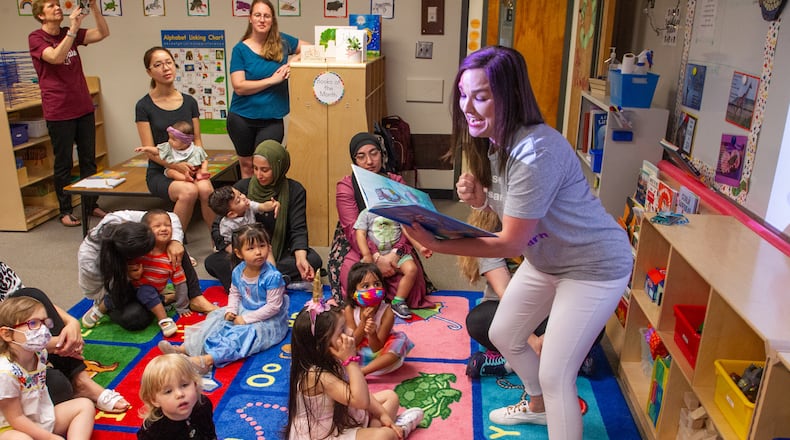Paola Aramendiz was worried about her son.
At 2-years-old, Daniel still wasn’t saying words and sentences. Aramendiz, who emigrated from Colombia, didn’t know where to turn to get help.
She and her husband were shopping for diapers, and discussing their concerns about their son, when another customer overheard them.
The customer suggested that Aramendiz visit the local Women, Infants and Children center. Staff helped her son get eight months of in-home speech therapy and a spot in Gwinnett County’s special education pre-K program.
“We’re the proof that early intervention is the best for kids,” Aramendiz said.
That’s the message Aramendiz shares as she attends events around Gwinnett aimed at touting the benefits of early learning.
Assessments conducted over recent years revealed that about 54% of Gwinnett children enter kindergarten unprepared, which slows learning development in the critical first years of school. More than one-third of Georgia’s third graders were considered below grade level in this spring’s state Milestones reading exam. The reasons vary, from limited exposure to educational topics to undiagnosed learning disorders. Some parents in Gwinnett wondered if the pandemic reducing social opportunities for their children would also have an effect once they got to school.
But Gwinnett, Georgia’s largest school district, is undertaking two major initiatives designed to get more children ready for school. It’s funding $3.6 million for pre-K in eight elementary schools. Gwinnett’s pre-K program had previously been for special needs students. Gwinnett will also expand its Play 2 Learn program, for children from birth to age 5, to all of its elementary schools.
Play 2 Learn requires earlier interaction than most early childhood programs. It also requires strong parental involvement by having them participate in the weekly sessions at school.
If successful, the two-pronged approach could be a model for other school districts across Georgia.
“Simply put, a child’s early years lay the foundation for all that is to come,” Gwinnett’s website dedicated to early learning states.
Demand outpaces supply
In Gwinnett, kindergarten teachers were the first to sound the alarm that their students weren’t ready to be there, limiting what they could teach effectively. That led the district to start assessing how teachers could help those children before kindergarten.
The flagship effort has been Play 2 Learn, a program for children and their parents that occurs in a classroom with the supervision of a licensed teacher.
Play 2 Learn teaches children motor skill development, language and literacy through fun activities. Kim Holland, the district’s director of early learning and school readiness, said the program has paid dividends — 80% of children who participated in Play 2 Learn were assessed as kindergarten ready.
Credit: Steve Schaefer
Credit: Steve Schaefer
Initially, Play 2 Learn was offered in just elementary schools with a large enrollment of impoverished students. It expanded this school year to all elementary schools in the district.
To an outside observer, a Play 2 Learn classroom can seem chaotic with children of different ages dancing, jumping and wandering around as their parents try to corral them back to the carpet with their teacher.
Holland said that’s what a classroom for children that age should look like.
“Play is hard,” she said. “It’s really rigorous and people don’t think about the rigor that’s involved in the play experience.”
Still, children can’t learn all they need to know in a weekly Play 2 Learn session — parents are meant to bring the lesson home.
Early learning proponents in Gwinnett repeat a phrase: “We believe that parents are a child’s first and best teacher.”
Over its six years, the program has built up demand among parents in the know, leading to a waiting list.
Meanwhile, the demand for the pre-K program is far outpacing supply. The pilot has 256 slots that were filled by lottery. The district would need to offer 3,000 pre-K slots to accommodate all interested families.
For years, the state has offered tuition-free pre-K through private child care centers, but several programs shut down during the pandemic and never reopened. That’s forced the district to be strategic, putting pre-Ks in parts of Gwinnett with the least access to the state’s program or even resources like libraries.
Mixed results nationally
While Gwinnett and community partners, like Building Babies’ Brains, are bullish on pre-K, some studies have questioned its effectiveness.
Earlier this year, a study of Tennessee’s in-school pre-K found that some students who went through pre-K eventually fell behind their peers who didn’t. Experts identified contributing factors like low level of district investment, inadequate training for the pre-K teachers and a lack of supportive resources outside of school and in higher grades.
But a study popular among early learning proponents found that students who received a spot in Boston’s pre-K were more likely to graduate high school and attend college. They were also less likely to be incarcerated as a juvenile.
Ideally, pre-K programs should concentrate on getting children accustomed to classroom learning and interacting with other kids.
“Just teaching kids the alphabet is going to pay off in a very short term,” said Gary Bingham, a professor in Georgia State University’s Department of Early Childhood and Elementary Education. Studies show “if you focus on more problem solving skills and more linguistic-based skills ... development tends to have a little bit longer life, impacting future learning.”
Bingham said equally important in early learning settings are social emotional learning and other soft skills: “The ability to really think through a problem — that’s why play is so important to learning. Kids get a chance to problem solve.”
Helping other moms
Credit: Steve Schaefer
Credit: Steve Schaefer
In Gwinnett, Aramendiz strives to fill that knowledge gap to ensure parents don’t need a chance encounter to help their children. She does this as an ambassador for Building Babies’ Brains, a group that consists of businesses, community organizations, county municipal departments and volunteers that support the school district’s early learning initiatives.
Members spread awareness of pre-K, Play 2 Learn and other programs. They hand out books and show parents activities to support learning at home. Drawing from her own experience, Aramendiz is an evangelist for the benefits of early learning and intervention.
“I want to help other moms and give them the feeling of safety and confidence,” she said.
Since Holland and others in Gwinnett decided to address kindergarten readiness, they turned to play rather than content drills, flash cards or a standardized list of knowledge points for hospitals to send home with new parents.
Early learning advocates say simple things like counting pieces of flatware as you put them on the table contribute to brain development.
“We want to show parents you don’t need a PhD to teach your kids,” early learning specialist Carolina Worthington said as she observed Emily Broick’s Play 2 Learn class at B. B. Harris elementary at the end of the school year.
Wearing a T-shirt that read, “brains are built, not born,” Broick read aloud from “The Rainbow Fish” and told a lesson about sharing. Some of the older students got the message, but it was probably lost on the babies in the room, sitting in their mothers’ laps.
But Worthington knew those babies were still learning. She pointed out one mom moving her baby’s hands like a fish swimming in the sea.
“That’s exactly what we want to see,” she said.
About the Author
Keep Reading
The Latest
Featured




